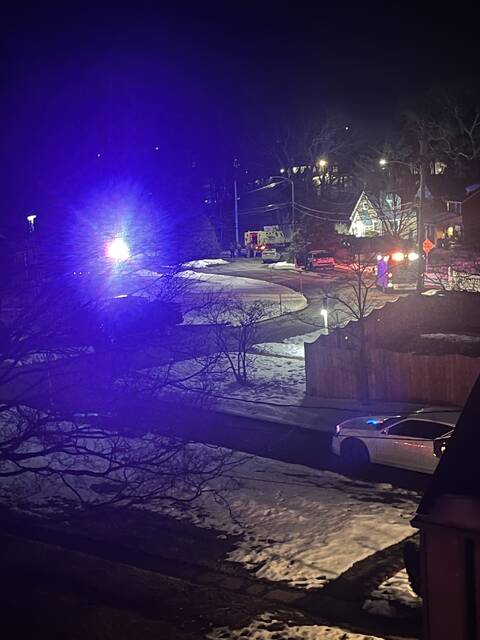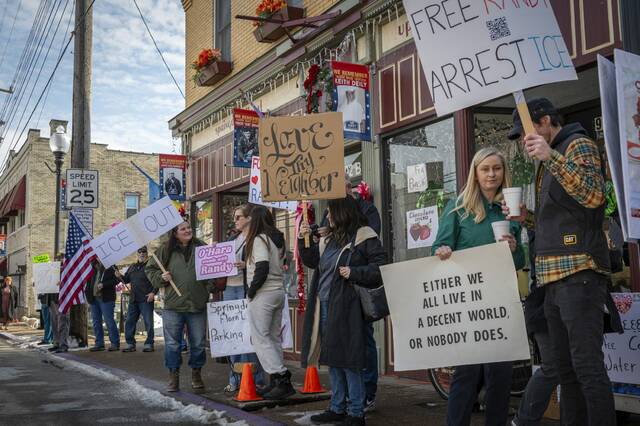The last Downtown Pittsburgh homeless encampment — on the Eliza Furnace Trail — has been closed as of Monday, city and county officials said.
People experiencing homelessness who used to reside there have been transitioned into more stable housing as recently as this past weekend. They were part of the “500 in 500” housing initiative launched by Allegheny County Executive Sara Innamorato in June 2024, designed to add 500 affordable housing units in 500 days.
Pittsburgh’s Eliza Furnace Trail encampment has officially been closed, city officials announced today.
— Megan Swift (@mgswift7) February 10, 2025
People who used to reside here have been transitioned into more stable housing as recently as this weekend through the 500 in 500 program @TribLIVE pic.twitter.com/pdHzSArIiV
“I don’t think any of us can imagine what people have been through that land them in a tent along one of our trail systems,” she said Monday in front of the trail. “It’s a difficult and challenging problem, it is multifaceted.”
‘More work to do’
The Eliza Furnace Trail encampment was located right behind the Allegheny County Jail. Part of the Three Rivers Heritage Trail, the passage is used by recreational bikers and commuters.
More photos of the area of the Eliza Furnace Trail that used to be a homeless encampment in Pittsburgh.
— Megan Swift (@mgswift7) February 10, 2025
It’s officially closed as of today @TribLIVE pic.twitter.com/O7MFfY1dL1
“We have dramatically reduced the number of people sleeping outside across the city,” Innamorato said, citing the 500 in 500 initiative. “The number of tents across the city are the lowest they have been in years.”
As of Jan. 31, 191 housing units have been created, and 278 people have been housed across those units, according to Innamorato, and 50 more units are in the works.
Specifically, at the Eliza Furnace Trail encampment this winter, there were about 30-40 tents at any given time — with a high of 56 tents on May 30, 2024, according to Allegheny County.
Recently, the county knew of 50 people who frequented the area and stayed there overnight at least occasionally. Of those, the county worked “intensively” with 27 who were staying there regularly in January, and nearly all left the trail for shelters or housing.
Across the city, the number of tents, including the encampment community on the South Side and individual tents, is less than 30, the county reported Monday. There used to be well over 100, the county said.
The 500 in 500 initiative has prioritized using existing rental units, accelerating efforts to repair empty rental units and converting facilities that don’t require extensive modification as housing, she said. The city Housing Authority is also providing expedited housing vouchers that people can use to access market-rate rental units.
Monday represented a victory for Allegheny County and Pittsburgh’s partnership in eradicating homelessness, she said.
“For people who want to use the Eliza Furnace Trail, but they heard or saw that there were a lot of tents, especially right behind the jail … we want you to know that it is cleaned up, and we hope that you will make the most out of this trail again,” Innamorato said. “Also, know that your neighbors who were here are in a safe place and working on stabilizing themselves and their lives.”
She said the trails are an important part of Allegheny County’s local economy and connectedness.
“We want to make sure that everyone has the opportunity to use them,” Innamorato said.
Muhammad Ali Nasir is director of Community Care & Resistance in Pittsburgh, the advocacy and outreach arm of 1Hood Media. He said what made the closing process of the Eliza Furnace Trail encampment different was that housing and shelter alternatives were made available before forcing removals — which is creating lasting solutions.
“Today, we’re not just marking the closure of an encampment, we are recognizing a fundamental shift in how our community responds to homelessness,” he said Monday at the former site. “For too long, encampments have been treated as if it’s a problem to be removed rather than a symptom of a broken system.”
Nasir said he’s committed to making this process the standard rather than the exception.
“This was not just about moving people … this was about making sure that they had a say in their future,” he said. “This is how encampments should be closed — with dignity, with care and with a commitment to the people who were impacted.”
However, there’s still “more work to do,” said Innamorato, and she wants to keep the momentum going.
Despite the Eliza Furnace Trail encampment joining the ranks of Pittsburgh’s encampments that have been shuttered — including most recently the homeless camp along the Three Rivers Heritage Trail near the 16th Street Bridge — encampments persist on the South Side. Innamorato said there are also smatterings of individual tents in various locations as well.
“We’re still working,” she said. “If it worked here, and we’re continuing to build those relationships and move people out, as far as counts of tents, we’re at the lowest we’ve been in many years.”
‘Beacon of hope’
During the announcement Monday, Pittsburgh Mayor Ed Gainey acknowledged he was standing in front of what appears to just be an empty space along the trail. The empty space, he said, represents “the power of collaboration.”
“This empty space is a testament to what happens when local officials come together with a shared vision and purpose to accomplish important things,” he said. “What once seemed like an insurmountable issue was met with real solutions, was met with dignity, was met with respect.”
Celebrating the closing of the encampment Monday makes the space a “beacon of hope” for the people who once lived there, said Allegheny County Director of Human Services Erin Dalton. “While we have much much more work to do in our community, we now have, I think, a really strong blueprint for how we house people in the future.”
Compared to the height of the pandemic and the opioid epidemic, when Pittsburgh and Allegheny County lacked the resources needed for shelter and housing, Dalton said the 500 in 500 initiative creates more flow in the shelter system — and hope for people experiencing homelessness.
Innamorato said that Dalton’s efforts have “ensured that we can work on the challenge of housing our unhoused neighbors in a … way that preserves people’s autonomy and also gives them a space to move from outside into permanent shelter.”
Gainey said the city is closer to meeting its goal of ending homelessness and breaking the cycle altogether.
“Whether they have shelter or not, everybody is somebody,” he said. “Coming out of a pandemic … we all know what this city faced … I know it’s been a rough-and-tough fight, but we did it.”
Property owners or managers who have units they’d like to dedicate to the 500 in 500 cause should visit the program website for contact information, Dalton said.
And if people identify someone staying outside, there are now outreach services and support that will enable those people to be housed “right away,” she said.
“If you are staying outside, you have our attention, you have our focus,” Dalton said. “And we want to help to find you the kind of housing solution that worked for people here.”








